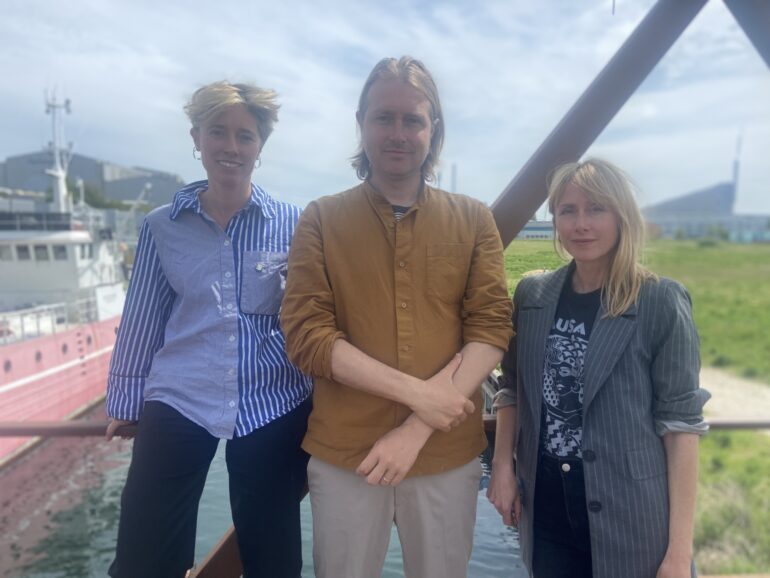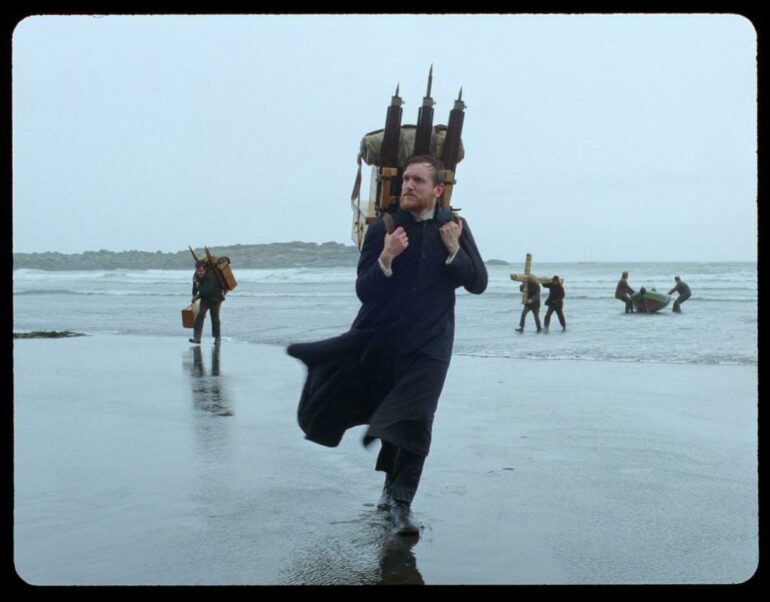WRITTEN BY: Annika Pham
Present at Un Certain Regard with Godland and the co-production The Blue Caftan, the production company is embracing the new formats and ways to work with talents.
For Snowglobe’s founding production trio Mikkel Jersin, Eva Jakobsen and Katrin Pors, the world has been their playground ever since they set up shop in 2015 thanks to their networks of production partners in Europe and beyond, and their taste for singular voices from around the word.
Norway’s Joachim Trier, Eskil Vogt, Italy’s Jonas Carpignano and the Danish talents Nicolas G.H. Johansen and Casper Rudolf, selected at Cannes 2021, were all associated to Snowglobe.
This year, the company is twice represented at Un Certain Regard with Godland by Icelandic-born Hlynur Pálmason and the Moroccan co-production The Blue Caftan by Maryam Touzani.
Pálmason’s second feature selected in Cannes after his 2019 acclaimed Critics’ Week entry A White, White Day, is set in the 19th century. It’s the story of a young Danish priest (Elliott Crosset Hove) who travels to a remote part of Iceland to build a church and photograph its people. But the deeper he goes into the unforgiving landscape, the more he strays from his purpose, the mission and morality.
Godland is Snowglobe’s third collaboration with Pálmason, all jointly developed with Iceland’s Joint Motion Picture, either as minority co-production (A White, White Day), majority coproduction (Godland) or joint production (the short film Nest).
Other regular partners associated to the feature include Sweden’s Garagefilm, Film i Väst and New Europe Film Sales. Scanbox will handle the domestic release.
Meanwhile The Blue Caftan landed on Snowglobe’s desk through their former Belgian co-production partner Velvet Films. “It’s a beautiful and important film from a female director,” said Jersin, about Touzani, whose earlier film Adam was Morocco’s Oscar’s entry. The film will be released by Camera Film in Denmark.
Relying on their close network of financing and creative partners, nurturing those relationships as well as talents, are vital ingredients to stay independent and on the cutting edge, as explained by Eva Jakobsen: “Indie production companies are being bought up by investors. But if you want to stay independent - which we do - you simply have to cultivate and maintain long-term partnerships with talents and international partners,” she said.
“Our motto at Snowglobe is to make sure we do the best arthouse films possible, within our limited financial means. Therefore everyone has to work 200% to achieve those goals, but it is getting tougher and tougher,” acknowledged Jakobsen’s colleague Katrin Pors.
Looking ahead, and after a reflective period during Covid that helped them crystallise their vision, the Snowglobe trio has stepped up a gear and is now fully prepared for Snowglobe 2.0.
“The old Snowglobe was just producing Danish films and minority co-productions. Now there are new formats and ways to work with talents,” said Mikkel Jersin. "On top of our regular work within the traditional distribution model, we will create features for streamers, work with talents not only in Danish but in other languages, and drama series will be another leg on which we will stand. In that sense, our business model will be much wider,” noted Jersin.
The first Snowglobe series will be the crime thriller Nemesis, produced with Norway’s The Oslo Company and Sweden’s Nordic Drama Queens. The high-end show reunites some of Scandinavia’s most experienced creatives including writers Camilla Ahlgren (The Bridge, Quicksand), Hilde Susan Jægtnes (Occupied 3), Jenny Lund Madsen (Follow the Money, Rita) and director Cecilie Mosli (Mammon, Three Wishes for Cinderella). The official logline says the series centres on a mother who takes fate into her own hands when her son is killed and justice falls victim to big politics. A broadcasting or streaming partner already attached is yet to be officially announced.
Several other TV projects are in development according to Jersin.
To support their expansion plans, the founding trio have hired three junior producers: Anna Dammegaard Søllested who produced last year’s Critics Week entry Inherent, Giulia Triolo, credited for Marianne Blicher’s debut feature Miss Viborg among others, and Clara Jantzen Kreinøe. “These up-and-coming producers are working with filmmakers of the future and will help us to stay on the cutting edge,” said Pors.

